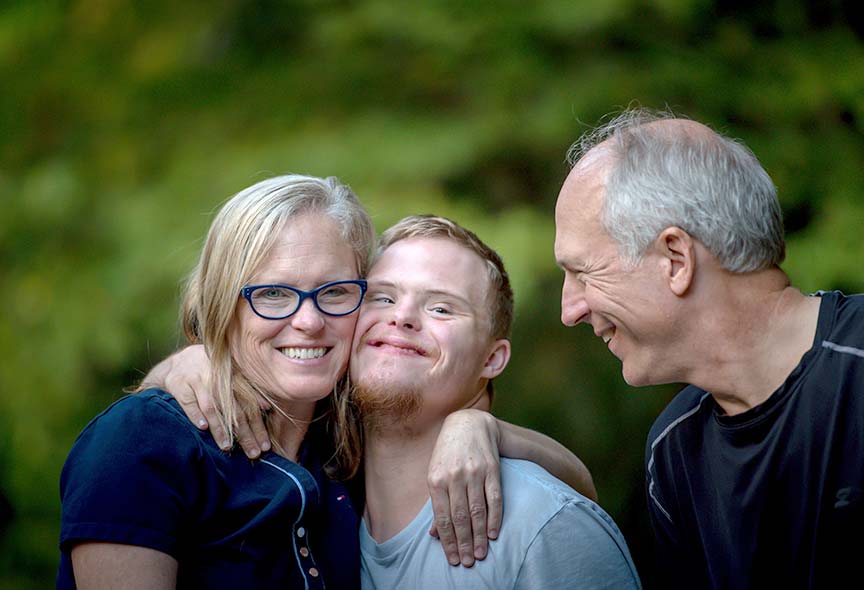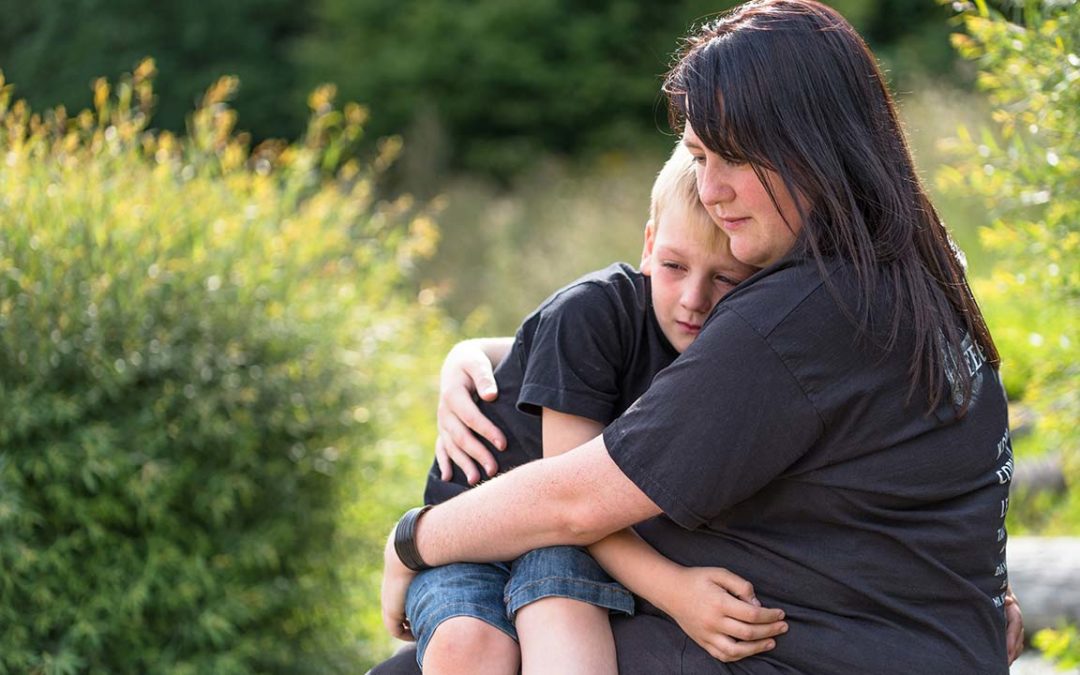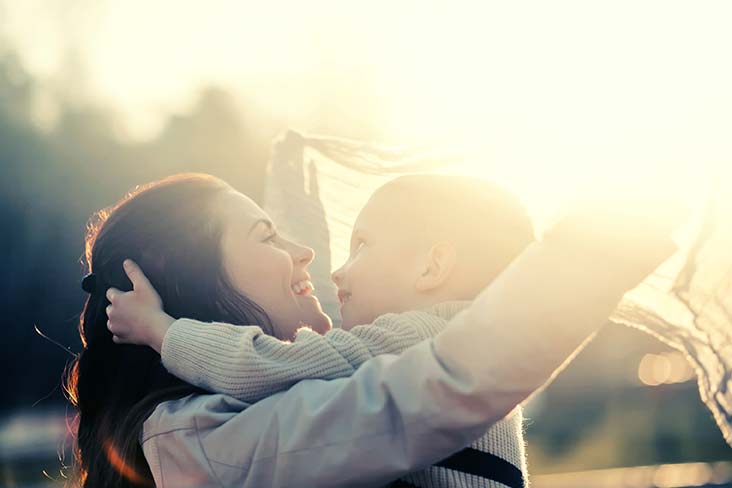
by Maude Leroux | Aug 28, 2017 | Parenting
I frequently walk the hallways of our private practice and my ears pick up the sounds of enjoyment, laughter and escalating arousal in a fun way. Whenever I hear a child produce a deep belly laugh, my heart warms within me and I simply have to share it with my own smile. When children run up to us in the waiting room and clearly show looking forward to their sessions and it is “me, me, me!” it is a profound moment of joy that fills my soul! Of course my thoughts wonder in the direction of what this must mean for parents?
We are living in a culture today, where product is celebrated much more than process, a difficult fact to reconcile with children, because all development is process. When we “expect”, we demand performance, and this performance may be elusive in the child that is still developing. I wonder how the parent is coping with messages such as: “You only have this window of time” or “ You have to close the gap to get him or her ready”. What are professionals really saying to the parent?
Embed from Getty Images
That the child is in dire need of performance with an ever-changing time line that increases anxiety?
That each time the parent witnesses a milestone in their child, they already start thinking of the next one?
- That when the child shows behaviors that seemingly was overcome before, the child must be “regressing”?
- That when the child melts down it must be something we (the parents) are doing wrong, the therapy is not working?
- As soon as the child plateau’s, we worry if the child is “standing still” and the push comes to find something else that works better?
- That the child is to be viewed through a lense of weaknesses, forgetting the multitude of strengths to be found in each person?
When we “expect”, we demand performance, and this performance may be elusive in the child that is still developing. I wonder how the parent is coping with messages such as: “You only have this window of time” or “ You have to close the gap to get him or her ready”. What are professionals really saying to the parent?
We also live in culture where family time is becoming less frequent and the intimacy this creates is elusive as time is a factor to consider. I want to provide parents with a few points to ponder:
- If typical development was good enough for your typical child, it is going to have to good enough for atypically developing child.
- Development is gradual, always an every day process, but the evidence in “product” goes in “hiding” as the child works the subconscious brain to consolidate the new information.
- When the child does not show progress in one direction, always look if anything else is changing for the better, as it is a common occurrence in early development that each skill often is developed separate, then becomes integrated with the rest. While this happens previously attained skills can go into “hiding”.
- That developing children are always living in the moment and are not worried about their school placement for next year or who they going to marry one day. The parent’s worry does not always match where the child is at.
- Development continues to develop even after the therapy session is over.
- When we expect more of the child than the child perceives he or she can cope with, we are asking them to create compensation and work very hard, increasing their arousal and threshold for frustration.
- The child does not know that his / her body is receiving information differently, they simply “cope” so by the time we challenge them, they are already anxious and working so much harder to overcome.
- What kids want most of parents are their attention, love and validation.
Embed from Getty Images
What to do?
Spend time with your child doing the things they like, even if it is 15 minutes
- Observe your child and find moments you can validate and give them compliments
- Find what they doing well and focus on it, rather than what they are not accomplishing yet
- Connection before correction, your relationship comes before your expectations, so the child would be more ready to accept challenge
- Revisit your family time over dinner and make that time special, talking about lows and highs. There is a reason why vacations are usually good for all in the family. Everyone is less stressed, less expectations, simply enjoying each other more. You do not have to do this all day. Just continue doing this over specific times and let the child know you are interested in what they are offering from themselves.
- It is the warmth in relationships that we all crave and that is a function of being human, your child is no different, they crave as much time with you in simply bonding and having their secure base (you) to surround them with emotional security.
- Stay in the moment, they will develop anyway without your anxiety of needing to propel them forward. Of course there is place for your anxiety and discuss this with your child’s therapist or your own therapist, you have a right to feel worried about your child’s future.
I hope this is a helpful start. Also know I am doing a webinar on “10 Golden Nuggets to empower your parenting” on September 13, 2017. Please contact me at maude@atotalapproach.com if you want more information.

by Maude Leroux | Jun 5, 2017 | Parenting
So many children suffer from anxiety in different shapes and forms. The first action usually taken is to refer to a counselor and to perhaps partake in medicine and there is nothing wrong with such practice, except perhaps that there is more to consider.
There are different kinds of anxiety. Some have trauma in their origin and is triggered by experiences that remind the child of this other trauma that had occurred before. Consider the child who has experienced multiple meltdowns in his past. Those were experiences wherein the child felt out of control and this was not a comfortable experience. It stand to reason that when this same child is faced with this possibility, he would become anxious in response to the fear of those meltdowns re-occurring. This in effect, could cause yet another meltdown to occur.
Because the child may be intelligent and coping well, have met all the regular developmental milestones, subtle cues are missed in earlier years and the child’s needs go undetected.
Other anxieties have to with the child’s experiences in her early life. There might have been earlier reasons why she was unable to form an effective attachment bond with her biological mother, causing her not to trust relationships. This hyper-vigilance to other people in her life causes her to go into an anxious overdrive, leading to fight and flight, and a continued cycle of more anxiety.
In other situations there may be strife at home and there is worry about the health, wealth and stability of the family, seriously affecting any feelings of well-being, leading to more anxiety.
Embed from Getty Images
But then there is an anxiety that few books talk about. It is related to performance anxiety rooted in developmental delay. Because the child may be intelligent and coping well, have met all the regular developmental milestones, subtle cues are missed in earlier years and the child’s needs go undetected. The child continues the developmental journey, but all through it with consistent edge of anxiety. By the time they are referred to us to check out their development in more detail, most of these children have already been to a counselor and have tried several medications.
Depending on the age the child’s needs are evaluated different profiles may have emerged over the course of time. Nellie may have become a perfectionist as she tries to do everything perfectly, leaving no stone unturned and not feeling good about herself unless she performs perfectly. Johnny was an honor role student all through the elementary years and suddenly started getting failing grades while in middle school. He has come to a point where he has just given up, having worked too hard during his school career and not feeling the rewards of all his effort.
Katie spends hours on her homework as she reads and rereads her work to ensure all is ok before she let’s go of it. Jennifer simply gets to a point where she melts down in frustration at the several different triggers that her homework provides every evening. It has become the most dreaded time for her and her family. Gregory made it through high school, has an above average IQ, and enters college, only to drop out within the first year. These are the most common profiles and can vary over different ages and stages.
The common factor on all is varying degrees of anxiety that continued and persisted through formative years of development and beyond. Every child with persistent anxiety should be checked out for developmental delay, that may be contributing to behavior. Getting to the root cause for the anxiety can change a child’s course for life and is a worthwhile investment. It will be different than treating only the symptoms, but target what is causing these anxiety symptoms to occur in this specific child.
And intervention could be different combinations of therapy aimed at the autonomic, limbic and central nervous system, including working through play or creative experiences. Children generally do not do best verbalizing their thoughts, but they do well expressing themselves through creative play, getting deeper into the subconscious to integrate those bothersome triggers. If we keep trying to understand a child’s anxiety, they will respond with resilience, curiosity and a presence of mind. This would be the child you know was “in there”, beyond the veil.

by Maude Leroux | Apr 7, 2017 | Parenting
I am going to veer off course for this writing and will continue discussing executive functions next time. We are leaving from South Africa today, back to the USA. I completed a series of different trainings and had some time with my mom in Durban as well as some time in the Kruger National Park. We encountered several lone elephant bulls with high levels of testosterone, as they were not close to any females to mate. On one particular occasion, a bull was walking down the dirt road towards us. Normally we would pass by peacefully, even stop to take a picture. This time though, this bull was not a happy camper and we had to reverse our vehicle quite some way, while the bull kept coming towards us. If we went to the left, he went to the left, we went to the right, and he went to the right. Finally, he decided to give and walked off the road. As he started to eat from one of his favorite trees, we put our car in gear and sped up to get past him. He charged out of the bushes, ears flapping, feet stomping, but we finally left him behind.
This encounter made me think. We were visiting his turf, he was on the prowl as his instincts were dictating him, and we were in his way. Our intentions were good, we wanted to enjoy him and we certainly did not want to harm this magnificent animal. He did not know our intentions though, made his own assumptions, and went into fight/flight mode. There was no way we could have whispered to his amygdala, we simply had to leave him be.
So it is with many of our children with developmental delay. When Sarah feels threatened no matter how good our intentions, she resorts to the more primitive parts of her brain and goes into fight / flight. This could look like a real fight, but also be a defensive posture or a “shut down” mode, where reason cannot enter. As well meaning adults we want to be able to use our verbal ability to calm, reason, kindly request, etc., but Sarah’s mind is perceiving threat and even if she was quite verbal, once the fight/flight kicks in, she does not have the same ability to use her verbal skills.
When Sarah does not respond in an equable manner to her parent’s request, her parents feel a number of things. In that car we felt our power dwindling and the beginnings of fear setting in. Likewise her parents feel the same kind of fear when Sarah does not appear to listen or “heed” a request provided to her. When her parents feel out of control of the situation, they themselves can go into a fight / flight as they respond to this feeling of helplessness, but in that car, with a bull looming over us, adult logic simply told us that trying to fight this bull was not going to be the brightest idea we have had so far! We decided to retreat and keep our distance and took our chances at a later moment.
What her parents need to be thinking about is not that she is denying them their authority or their parental power, but rather how are they modeling for her what power looks like so she could follow by example.
So it also would be with Sarah. When she is in fight / flight with no access to reasoning, it sometimes is better to retreat for now, give her time to gain control over her emotions, gain better access to reason, and then to advance in maybe a slightly different way again. Power struggles are often futile ideas, just as it would have been for us to try to overpower that bull that day. And most parents have lived it; the feelings of helplessness leading to not feeling in control and then going over into some action to gain control and so the power struggle begins one more time. The power lies in understanding the game. When Sarah is having a good day, she has access to the best parts of her skill and she will attempt more activities than usual. On a “not so good” day, she will go into fight / flight more often and if her parents persevere with their control over her on those days, she will fight for her own control and pretty soon, we have a blow up on our hands. If we understand that Sarah requires a little more time on those days, if we retreat and come back later, we will not only have provided her the time to get her emotions under control, but also have preserved her (and our) dignity, self esteem and ego integrity. We left that bull intact, and even though a little shaken, we were intact as well.
Embed from Getty Images
The power lies in choosing your battles wisely. Do not assume that Sarah’s behavior is “manipulative” in a negative way. She is still developing, still learning how to use her power and her control, and this process would be under construction until the age of at least 24 years according to research. What her parents need to be thinking about is not that she is denying them their authority or their parental power, but rather how are they modeling for her what power looks like so she could follow by example. Tough one, especially when we all carry our own issues. But it is also true and as parents we can only try. When we “goof up” we need to go back and repair, and model to her what sorry really looks like and build empathy in the process as well.
Nobody won, not the bull, neither did we. Nobody had to “win’! Both gained the freedom of being alive, of feeling important emotions and the compromise did not violate our ego integrity and neither did it harm us or the bull. We have stayed on course in order to gain another day and were wiser for the experience.
Until next time,
Maude

by Maude Leroux | Jan 9, 2017 | Parenting
The ship was full and many things were happening. Lives were connecting and the journey was on its way. The captain was steering the ship when he noticed the tip of the iceberg in his path. He did attempt to mobilize the ship around this mound of ice and felt comforted by his efforts. He did not foresee what was lying underneath the surface of the waters he was navigating. Underneath the surface was a huge amount of ice that eventually caused the destruction of the Titanic.
No, I do not want you to think about destruction, but simply think about what it is that you see, and what you do not see. We feel safe in what we can observe and see in Karl, because we can analyze that and we think we can find ways to intervene. But then we try our interventions and for some reason what we thought we saw does not quite work out the way that we logically thought it would. The difference is in what is lying underneath the surface.
Embed from Getty Images
The iceberg below the surface is all of the developmental pieces that have to come together in order to execute and learn efficiently. What we see now is a direct result of Karl’s understanding of his own body and his own way of interpreting the world. What we do not see is where it is coming from. If we simply attempt to navigate around the tip, we are frequently disappointed in our efforts and we jump from one intervention to another, thinking the intervention is at fault. It frequently is not the intervention, but the timing of the intervention.
What is a developmental delay? On paper we state that Karl may be 1 or 2 years behind in reading, math or social maturity to name a few, but what are we actually saying? Why is it a “developmental” delay? Because quite simply Karl’s nervous system has not matured to the level commensurate to his peers. Why do we keep insisting he must look, behave and learn like his peers on the very same activities that his peers are doing? How are we matching Karl? At what level of development does he feel most comfortable to learn from at this moment in time?
What we see now is a direct result of Karl’s understanding of his own body and his own way of interpreting the world. What we do not see is where it is coming from.
So many families believe in tally sheets of checking off that their “Karl’s” have gotten 8 out of 10 today or 5 out of 6 trials today and I frequently wonder at the functionality of it all. If Karl is working away at an activity or an expectation beyond the maturity of his central nervous system, what does these tally sheets matter? Are we training his cognitive brain to do what his central nervous system disallows him to do? Is the only answer we have for him to cope and accommodate his system rather than to remediate and alleviate the pressure of the developmental delay? What does it matter if Karl can memorize aspects rotely and can learn to do something in a certain way, but it holds no meaning for him to generalize this same skill in a different time, space or environment.
The brain is far more complex than simply looking at Karl’s learning behavior. He is more than that and he deserves to be known at the level commensurate to his maturity level. The beauty of matching his developmental level is that you can apply targeted intervention aimed at the more precise point of origin and have far longer lasting success that comes from within and enables Karl to chip away at the iceberg underneath the surface himself and navigate his own ship through the murky waters of uncertainty, slower processing speed and gray areas of social-emotional maturity that is so hard to teach.
In the next couple of blogs I am going to focus on different aspects of executive functioning and what is necessary to develop these areas of function.
May your journey be fruitful in 2017!
Maude

by Maude Leroux | Dec 20, 2016 | Parenting
I am sure that most families right now are getting ready for the bustle of end of year activity with great amounts of energy. It is family time for most and also catching up with friends you have not heard from in a long while. We are all engaging in reflecting on the past year and recalling wondrous moments, as well as times where it would have been better to simply not have left the bed!
Children reflect in their play. This is likely the most misunderstood aspect of childhood as the world interferes with activity that requires product and not process. We all want to see what the child can do, what the child can accomplish and we want to answer the question of how far did we comes this year. It would be so great to measure our success by what we can see or observe in every day life.
Yet, the child does so many things unseen by us. We know that they listen, that they perhaps can use language effectively, that they can build a structure, but do we know their thoughts? Is there truth to “you are what you think you are”? Why do we sometimes observe behavior that is not logical to the moment, that interferes with our wishes for a child’s behavior, and that is not deemed “publicly appropriate”? Do we truly understand why the child engages in what he or she does?
When children play they experience the world as they see it. They control the play. They choose the activity, the characters, the symbols and the scenes. They play out what is important to them.
Children are developing minds, not developing bodies alone. They have to figure out their world with what they have available to them in their own capacities of understanding. Each experience you have had in the past is linked to a limbic memory (emotional memory) and we bury these experiences with their emotions in the subconscious regions of our mind. When we recall these past events, we immediately feel the emotion that went alongside with it. We do not learn to do this as adults, but when were developing as children. The memories you are making during this end of year family time are going to become one of those subconscious limbic memories.
When children play they experience the world as they see it. They control the play. They choose the activity, the characters, the symbols and the scenes. They play out what is important to them. The two year old may play out a lot of “baby” themes as they embark on this exciting but scary world of exploration, especially if mommy has a new baby to pay attention to. The 4-year may play out big monster and scary themes as they stand on the important precipice of discovering their own self-identity and also gain a few nightmares in this process. The 5 year old may play out his ambivalence toward going to the “big school” next year and the need to still be cuddled and nurtured and not to be expected to “grow up”. The Kindergartner may play out teacher and children themes to figure out authority and the limits of his own autonomy. Other times children play out experiences in their lives like going to the doctor or dentist or some happy family event like going to the beach.
Embed from Getty Images
It is during play that the child is learning the very self-reflection that we as adults take for granted every day. Can you imagine not having the ability to think back on loved ones you may have lost? Or not to have the ability to think on how you solved a similar problem before, so you could engage in a similar strategy again? How do you measure this ability? How do you rate this ability in importance? Yet, we can get so stuck on only what we are able to see. What is my child eating, how is she writing, or speaking, but rarely “how is she thinking” and how does her self-reflection affect her daily performance. How is she developing her self-esteem and sense of self based on her experiences? We are so engaged in goals in every realm of activities of daily living, but do we really know the mind of our child?
We frequently see a strong phenomenon at our center in a number of kids we serve. They may go through the physical part of our program quite well and achieve great results, but they may still exhibit behaviors at home or school that looks like nothing has changed. This is so frustrating for families who are so invested in seeing their little one do better. In actual fact, they are doing better, but their own minds have not made that emotional leap as yet to simply trust the new experiences and let go of the past uncomfortable learning experiences. This frequently takes time and requires a certain amount of play to process the emotional mind’s adaptive response to their “newer” nervous system. In play the children will choose themes that are dear to them; the child who is bedwetting still may put a toilet in the middle of a wild forest; the child with an eating disorder may choose a whale to feed; the child who lacks a sense of power may become the biggest wizard of all times! The list goes on. Children will frequently play the character they most fear or not understand so they could practice seeing the perspective of both sides. Frequently they will bring up themes from past “traumatic” experiences that they will re-enact with the “new” experiences to make sense of the past.
I can go on and on, but really want to leave you with one thought during this end-of-the-year time. How barren would your life have been if you did not have the ability to self reflect and make sense of past experiences? How much attention are you paying to the developing growth of the mind of your child to achieve this same amount of fullness?
Warm hugs to everyone!
Maude

by Maude Leroux | Sep 28, 2016 | Parenting
I am sitting at the airport in Missouri and am reflecting on the past ATTACh conference that concluded at noon today. I have so many thoughts, with multiple trajectories to traverse as I try to connect the information in the interstates of my brain. This conference has a fair complement of both parents and professionals and the different discussions were very productive indeed. I stand amazed at how much information we do have about the brain and our inter-connections we have with each other as human beings. I stand equally amazed that in the face of this information and research, we still live in a society that over emphasizes productivity and live in a state of perpetual performance anxiety because of it. It is such a strange dichotomy with no research or evidence that it is making us even a little happier.
Parents perpetually feel that in order to be “good” parents they have to be able to provide as much opportunities as possible for their child to participate and perform. The sense of pride with achievement is well understood and I have real empathy and also joy for sharing in this with the many families we serve. But I also often become quiet in my mind and ask myself what for? If you ask me to reflect on a favorite childhood memory, it is always a reflection of all 5 of our children sitting on my parents bed on a Saturday morning, enjoying our coffee together and laughing so hard that my father has to put his book down because we are shaking the bed too much for him to continue reading. Do I have many memories of singing trophies, acting in drama, playing “netball” (women sport in South Africa), being a sports team leader etc, yes! But it is not my first memory that I welcome in my mind. I think about our many family vacations, driving what seemed like hours and hours in the car to get to our destination. I think of sitting between my two big brothers who kept poking at each other over and beyond me that I have to sit forward in my seat and just let them go at it behind me. These are my memories. They are favorite ones, but not the ones in which I need to perform or “be the best I could be”. I could simply just be! How much do you value this ability of simply just “being” today?
I stand equally amazed that in the face of this information and research, we still live in a society that over emphasizes productivity and live in a state of perpetual performance anxiety because of it. It is such a strange dichotomy with no research or evidence that it is making us even a little happier.
We hear of social media, we have 500 friends on facebook, but whom are we connecting with? How much do we truly listen to each other and truly try to “get” what each other is going through? Parents are pressured in so many directions today. They feel the stress of “the window of time” that is now and we have to do what we can in an effort to cross the bridge. Many professionals fall into the performance pressure and even omit developmental milestones, to enforce skills the child may not be ready for. We have to see the product, the child has to speak, and the child has to perform. We even have families coming to us that are having 3 year olds in 30 to 40 hours a week of therapy, not leaving any time at all for the most productive therapy of all: Play! A number of year’s back 4-year-old twins were referred to me and was already put on a stimulant for ADHD. The brain has not even matured yet, but they have to pay attention! I do not blame parents at all. They only do what we professionals model for them to do, go for performance and live on the fear of the child not catching up in time.
Embed from Getty Images
Development requires of us to attune with each other, to be social and to thrive on human connection. On Thursday Dr. John Baylin said we humans have “fancier” brains. What makes us unique is our unique properties of caring, nurturing and taking care of our young. Dr. Daniel Hill stated that infants can read their parents state of mind within the first day of life. What makes us different is the way we can feel “felt” and connect with each other. Instead we want to compete, fight for our piece of this wonderful earth and live each day with the stress of needing to outperform each other. Why? I am not certain I understand? Is it not great to invite a couple of friends over, break some bread together and simply enjoy being with each other?
Our children with special needs have an even stronger need to feel “safe” today. Because it is harder or them to understand the world, they need even more to be understood and to be given time to process and create a response that would be both creative and reflective. We think because we are more mature we know better than them and we surely have their best interests in mind, therefore we try to fit them in the holes we prepare for them and we are unhappy when they do not follow suit. At school we expect performance that has to be educationally “relevant” and therefore we fit the square peg into the round hole as much as we can. When the child starts to go into fight and flight our next answer is either to label him or her with a diagnosis or to bring in a behavior specialist because surely the child is to “blame” for his or her behavior?
No, my mind reasons that we are doing children an injustice. Children need family to feel secure and safe. They need to be working at their pace in order to understand their world. When they are not stressed by performance demands, they are “freed up” to go on developing and do this at a faster rate than we can plan. We need to think about what we are doing. Of course we need therapy to push at the right time and the right place, but this does not have to be 30 to 40 hours per week with no modeling of family joy and simply playing and exploring the world. We need to bring balance back and as professionals we have to model “connection before correction”, a concept I will write more about next time!
Warm regards,
Maude







Recent Comments